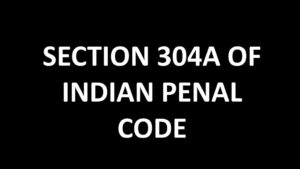Table of Contents
Introduction
Death by Negligence: Section 304A of the Indian Penal Code talks about causing death by negligence or rash act. This Section mentions that if a person causes the death of another person by doing a negligent or rash act which does not amount to culpable homicide shall be punished with imprisonment for a term of a maximum of two years, or with a fine, or with both. For understanding the whole concept given in Section 304A we need to understand the term negligent act.
Section 304A
Section 304A of the Indian Penal Code talks about the death caused by negligence. This Section was not there in the Indian Penal Code in 1860 but was inserted later in the year 1870. It does not make any new offense but covers the offense that falls outside Sections 299 and Sections 300. Here there is no intention or knowledge to cause death.
Also, Read SECTION 376 OF THE INDIAN PENAL CODE
Example
Where a mother of a child leaves the child in a street in such a way that the child is visible to the audience coming in the street. Here the motive of the woman is that her child could be taken by someone by seeing it. But if the child kept there dies due to starvation then its mother would be liable for causing death by negligence. It is because in the second case, there is no intention to kill someone.

Negligent Act
Section 304A of the Indian Penal Code talks about causing death by negligence or rash act. This Section mentions that if a person causes the death of another person by doing a negligent or rash act which does not amount to culpable homicide shall be punished with imprisonment for a term of a maximum of two years, or with a fine, or with both. For understanding the whole concept given in Section 304A we need to understand the term negligent act. It became important to have proper knowledge regarding this term. In the legal field ‘ negligence’ can be defined as an act or omission that causes damages to the property of another person.
Here in this Section of the Indian Penal Code, the term rash or negligent act can be defined as an act that is the immediate cause of death. There is a difference between these terms( rash and negligent) also. By ‘rash act’ we mean any act which is done restlessly. By the term ‘negligent act’ we mean a breach of duty due to omission to do something, which a reasonable man will do.
There are four basic elements that a person has to fulfill in order to do a negligent act. These elements are as follows:
Also, Read SECTION 125 OF CODE OF CRIMINAL PROCEDURE
- Duty: For committing a negligent act, there must be some duty on the part of the defendant. Here it is important to understand whether the defendant has taken legal duty of care towards the plaintiff.
- Breach of Duty: After fulfilling the first criteria the plaintiff must prove that the defendant has breached the legal duty imposed on him/her. It talks about the breach of duty on the part of the defendant which he/ she is expected to do as he/ she has some legal duty towards the plaintiff.
- The action of causing something: It means that the damage caused to the plaintiff is due to the act of the defendant. Here the defendant may do an act which is not expected from him/her or the defendant may be negligent in not doing an act which was expected from him/ her.
- Damages: At last what matters is, that there must be some damage/injury that is caused to the plaintiff and these damages should be the direct consequence of the defendant’s act.
Punishment
After proving the person’s liability under Section 304A of the Indian Penal Code it becomes very important to punish those offenders. The punishment for death which is caused due to the negligent or rash act of the accused is prescribed under Section 304 A of the IPC itself. According to this Section, a person who is held liable for causing the death by negligence can be punished with a two-year jail or be fined for the same, or can be punished by both.
The term of imprisonment depends on the gravity of the crime and imprisonment can be rigorous in nature or can be simple in nature. Its nature is also defined by the gravity of the crime and it varies from situation to situation as it depends on the situation. It is a cognizable offense and has been put in the category of a heinous crime. Here the police officer can arrest the accused without a warrant. It is a bailable offense and bail can be granted by the police and the court.
